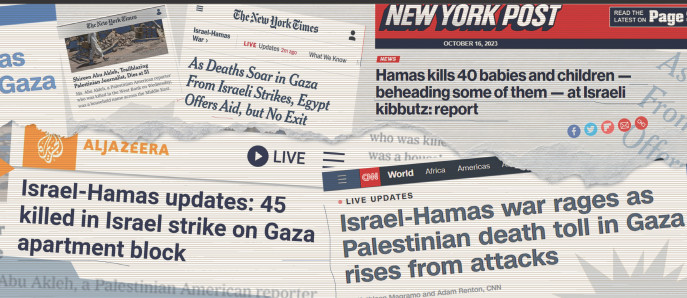Disinformation & the Role of Media Amidst Israel-Gaza Crisis

Courtesy of The Business Standard
By Nadine Samy
After Hamas’ attacks on Israeli civilians and the Israel Defense Forces (IDF) retaliating by bombing multiple villages of Gaza, the spread of disinformation has been prominent on various media outlets from news articles to social media posts.
One claim surfaced online and went viral that Hamas had decapitated 40 Israeli babies and sexually assaulted and murdered women. The claim about mutilated babies was first made by Nicole Zedeck, an Israeli journalist, who reported on i24, a Tel Aviv-based news channel, that she saw beheaded babies by Hamas with her own eyes.
US President Joe Biden then reiterates the claim during a meeting at the White House, saying he has seen confirmed pictures from Israeli news reports of the beheaded babies. In this speech, he also claimed that Hamas assaulted Israeli women, which according to the Forward, was a fact delivered to Biden from Prime Minister Benjamin Netanyahu through a phone call.
A report by CNN said that the Israeli prime minister’s office confirmed the claim as well, releasing a statement about the “horrifying photos of babies murdered and burned by the Hamas monsters.”
The lack of evidence of both claims on social media sparked a debate over the validity of the claim while the rumor was going viral, with some suggesting that there was evidence that claimed IDF soldiers did the same to Palestinians.
A White House spokesperson later came out, clarifying that Biden and US officials have not seen pictures confirming the beheadings. Similarly, Israel military officials reported that they cannot confirm the beheadings of the babies by Hamas.
In response to the rumor of assaulting women, Hamas uploaded a video where an Israeli female hostage and her children are seen being released, seemingly unharmed.
Pictures and videos shared online from both Israeli and Palestinian sources are being mixed up and wrongfully associated, as usually happens during divisive issues.
Popstar Justin Bieber uploaded a story on his Instagram account, sharing a post with the words, “I stand with Israel,” with the background of demolished buildings.
This soon went viral as people quickly realized the picture in the background was actually of a village in ruins located in Gaza caused by the Israeli bombings.
He later deleted the story, but the incident led to online outrage in regards to misinformation being spread so easily, especially from people with prominent reach like celebrities and government officials.
While passionate social media users rush to social media to post their opinions, they accuse Instagram of shadowbanning, or limiting their visibility, and censoring certain posts that are pro-Palestine. There have also been cases reported of accounts being suspended for being pro-Palestine.
Meta released a statement in response to their policies being criticized.
“Given the higher volumes of content being reported to us, we know content that doesn’t violate our policies may be removed in error,” Meta wrote.







